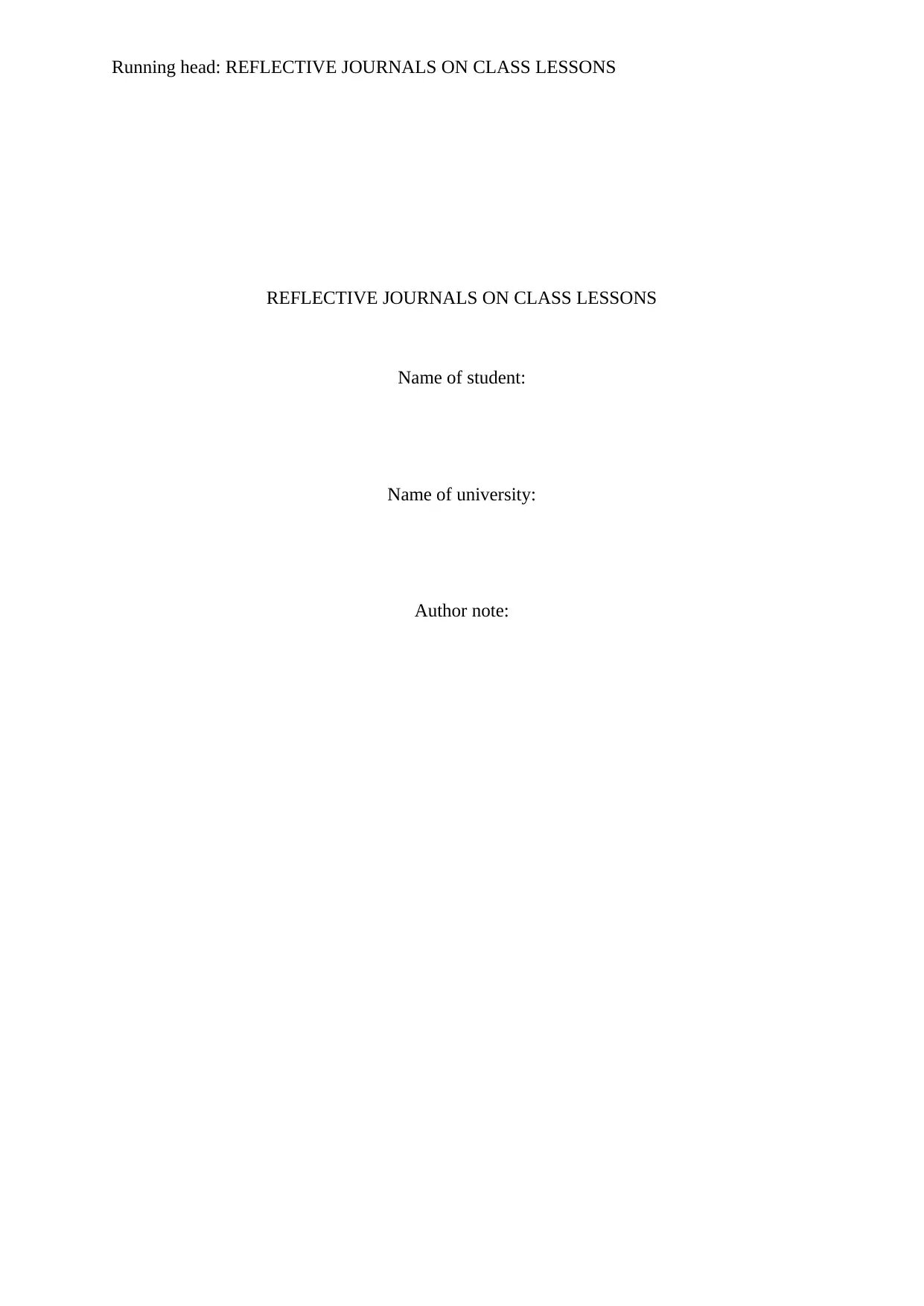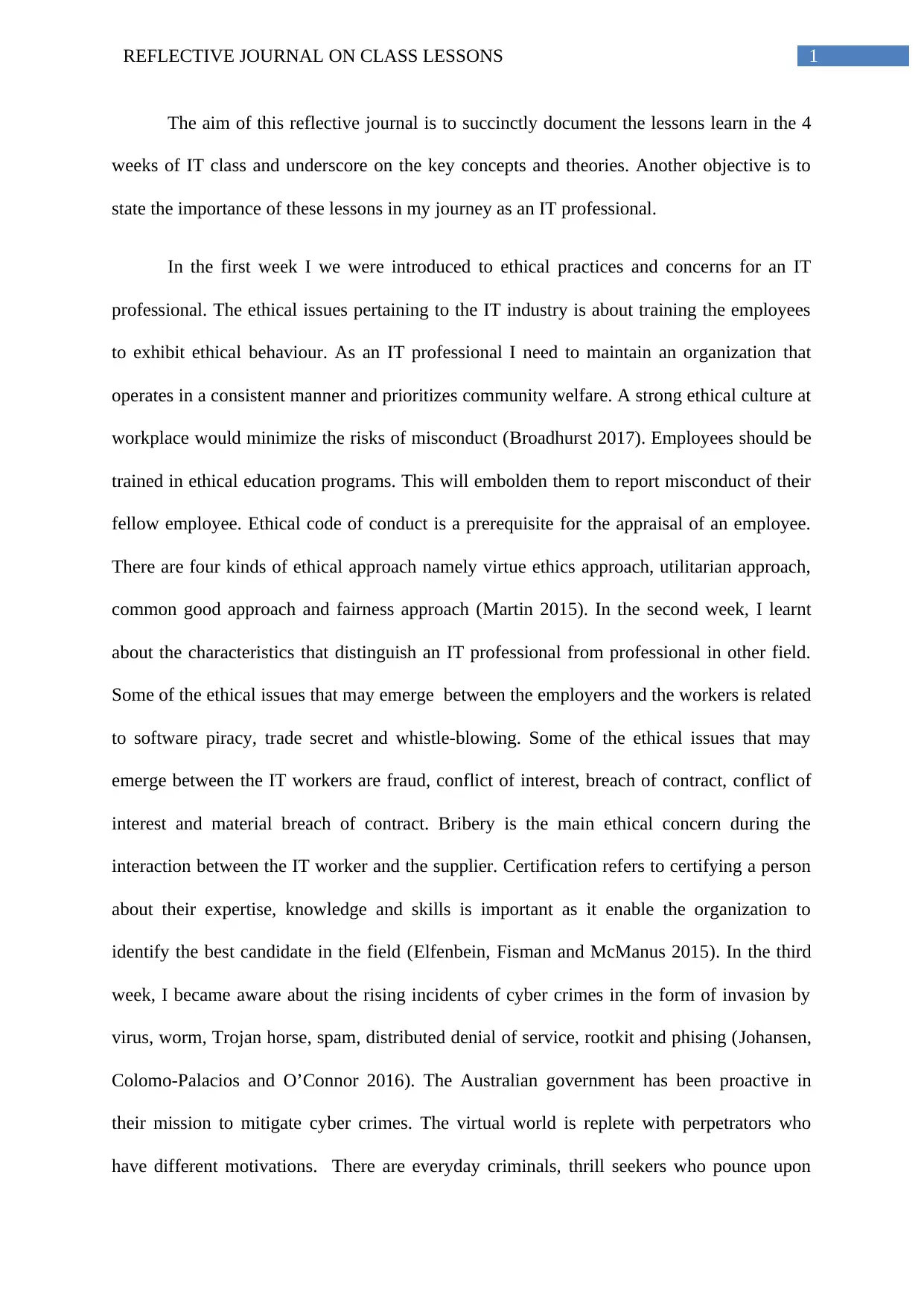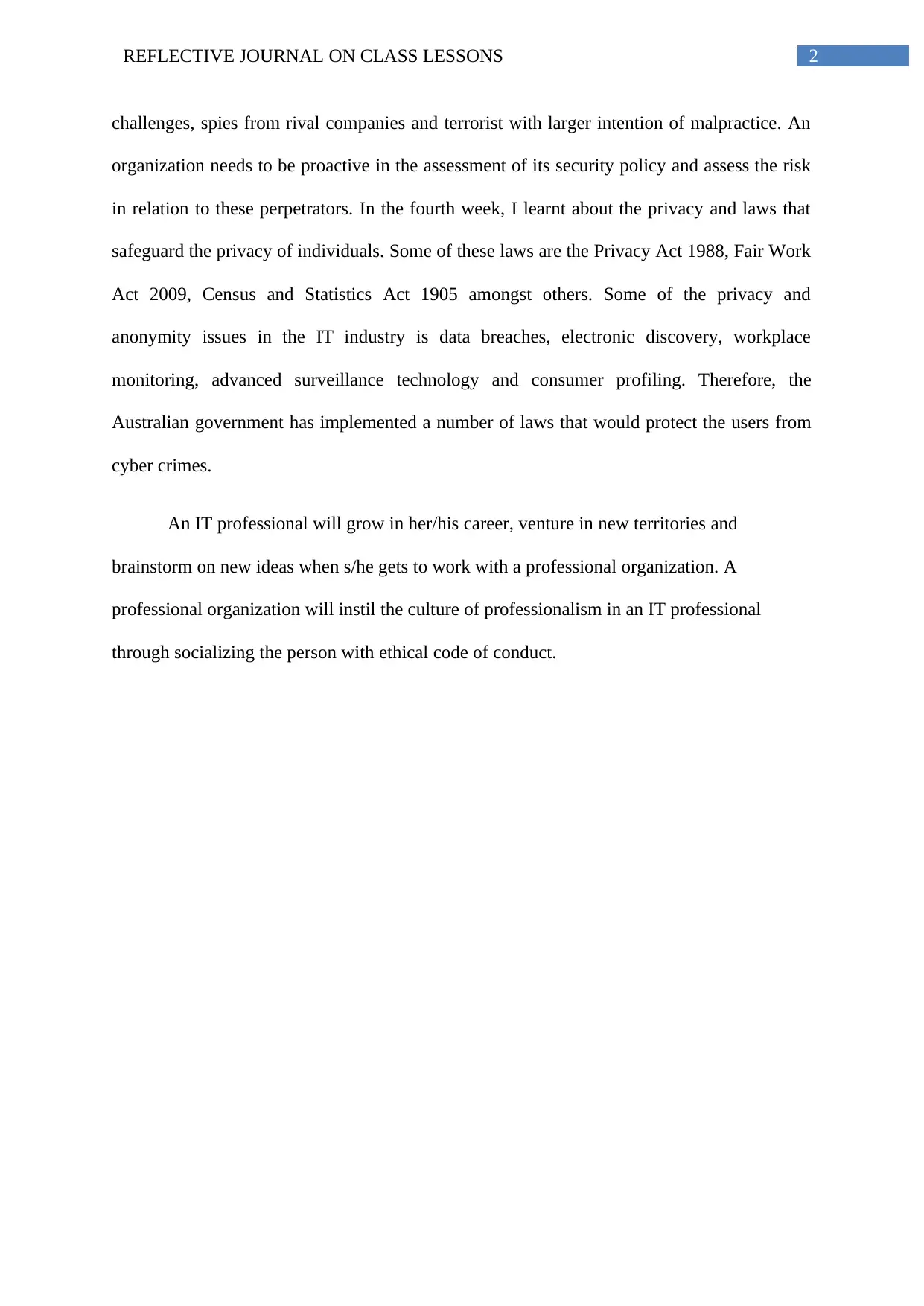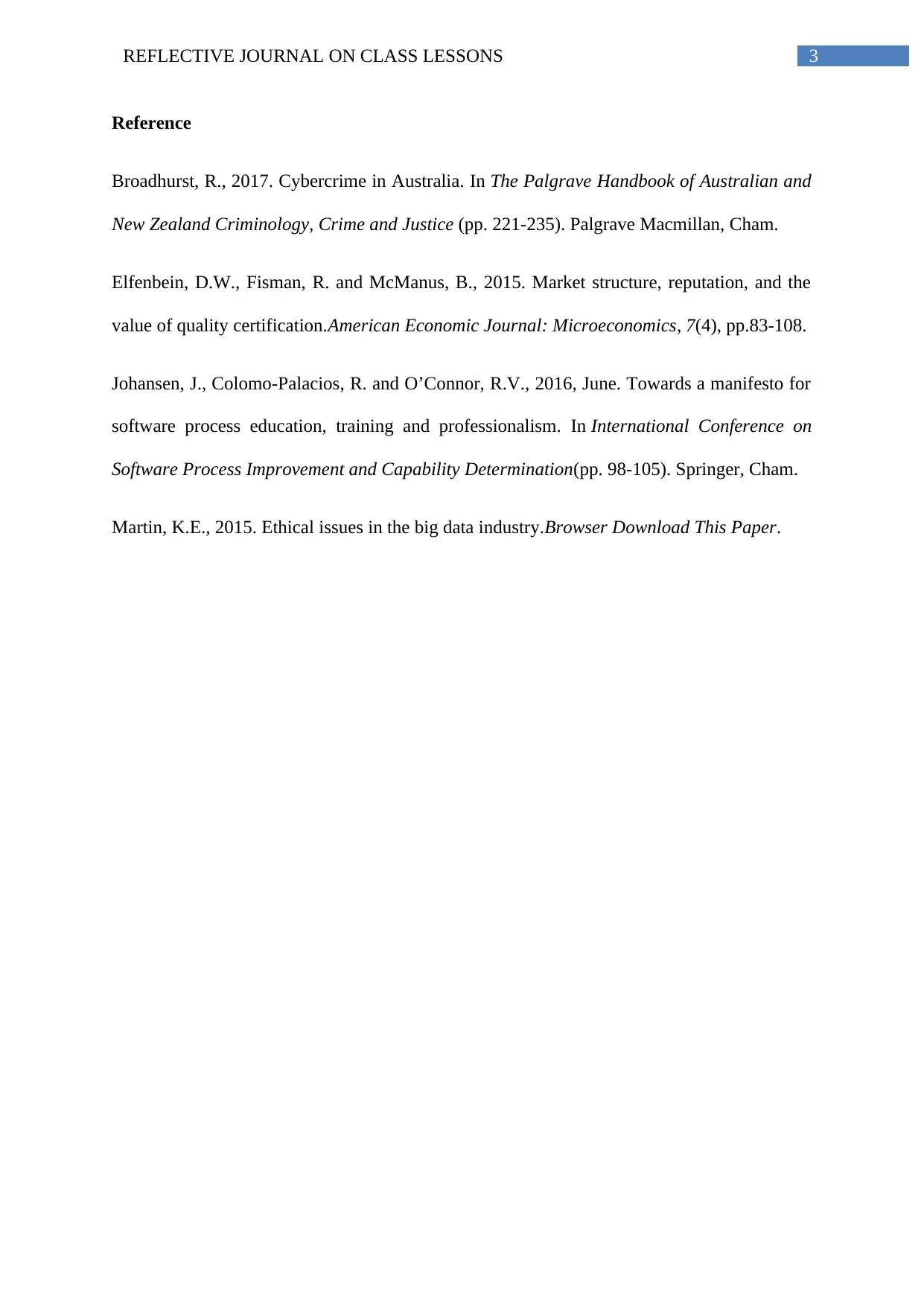ISY1000 - Reflective Journals on Ethics in Information Technology
VerifiedAdded on 2023/06/15
|4
|759
|178
Journal and Reflective Writing
AI Summary
This reflective journal documents lessons learned over four weeks of an IT ethics class, emphasizing key concepts and their importance for an IT professional. Topics covered include ethical practices, the distinction of IT professionals, rising cybercrime incidents, and privacy laws in Australia. The journal highlights the importance of ethical behavior, certification, and proactive security policies. It also discusses the role of professional organizations in instilling ethical conduct and safeguarding individual privacy in the IT industry. This document is available on Desklib, a platform providing study tools for students.

Running head: REFLECTIVE JOURNALS ON CLASS LESSONS
REFLECTIVE JOURNALS ON CLASS LESSONS
Name of student:
Name of university:
Author note:
REFLECTIVE JOURNALS ON CLASS LESSONS
Name of student:
Name of university:
Author note:
Paraphrase This Document
Need a fresh take? Get an instant paraphrase of this document with our AI Paraphraser

1REFLECTIVE JOURNAL ON CLASS LESSONS
The aim of this reflective journal is to succinctly document the lessons learn in the 4
weeks of IT class and underscore on the key concepts and theories. Another objective is to
state the importance of these lessons in my journey as an IT professional.
In the first week I we were introduced to ethical practices and concerns for an IT
professional. The ethical issues pertaining to the IT industry is about training the employees
to exhibit ethical behaviour. As an IT professional I need to maintain an organization that
operates in a consistent manner and prioritizes community welfare. A strong ethical culture at
workplace would minimize the risks of misconduct (Broadhurst 2017). Employees should be
trained in ethical education programs. This will embolden them to report misconduct of their
fellow employee. Ethical code of conduct is a prerequisite for the appraisal of an employee.
There are four kinds of ethical approach namely virtue ethics approach, utilitarian approach,
common good approach and fairness approach (Martin 2015). In the second week, I learnt
about the characteristics that distinguish an IT professional from professional in other field.
Some of the ethical issues that may emerge between the employers and the workers is related
to software piracy, trade secret and whistle-blowing. Some of the ethical issues that may
emerge between the IT workers are fraud, conflict of interest, breach of contract, conflict of
interest and material breach of contract. Bribery is the main ethical concern during the
interaction between the IT worker and the supplier. Certification refers to certifying a person
about their expertise, knowledge and skills is important as it enable the organization to
identify the best candidate in the field (Elfenbein, Fisman and McManus 2015). In the third
week, I became aware about the rising incidents of cyber crimes in the form of invasion by
virus, worm, Trojan horse, spam, distributed denial of service, rootkit and phising (Johansen,
Colomo-Palacios and O’Connor 2016). The Australian government has been proactive in
their mission to mitigate cyber crimes. The virtual world is replete with perpetrators who
have different motivations. There are everyday criminals, thrill seekers who pounce upon
The aim of this reflective journal is to succinctly document the lessons learn in the 4
weeks of IT class and underscore on the key concepts and theories. Another objective is to
state the importance of these lessons in my journey as an IT professional.
In the first week I we were introduced to ethical practices and concerns for an IT
professional. The ethical issues pertaining to the IT industry is about training the employees
to exhibit ethical behaviour. As an IT professional I need to maintain an organization that
operates in a consistent manner and prioritizes community welfare. A strong ethical culture at
workplace would minimize the risks of misconduct (Broadhurst 2017). Employees should be
trained in ethical education programs. This will embolden them to report misconduct of their
fellow employee. Ethical code of conduct is a prerequisite for the appraisal of an employee.
There are four kinds of ethical approach namely virtue ethics approach, utilitarian approach,
common good approach and fairness approach (Martin 2015). In the second week, I learnt
about the characteristics that distinguish an IT professional from professional in other field.
Some of the ethical issues that may emerge between the employers and the workers is related
to software piracy, trade secret and whistle-blowing. Some of the ethical issues that may
emerge between the IT workers are fraud, conflict of interest, breach of contract, conflict of
interest and material breach of contract. Bribery is the main ethical concern during the
interaction between the IT worker and the supplier. Certification refers to certifying a person
about their expertise, knowledge and skills is important as it enable the organization to
identify the best candidate in the field (Elfenbein, Fisman and McManus 2015). In the third
week, I became aware about the rising incidents of cyber crimes in the form of invasion by
virus, worm, Trojan horse, spam, distributed denial of service, rootkit and phising (Johansen,
Colomo-Palacios and O’Connor 2016). The Australian government has been proactive in
their mission to mitigate cyber crimes. The virtual world is replete with perpetrators who
have different motivations. There are everyday criminals, thrill seekers who pounce upon

2REFLECTIVE JOURNAL ON CLASS LESSONS
challenges, spies from rival companies and terrorist with larger intention of malpractice. An
organization needs to be proactive in the assessment of its security policy and assess the risk
in relation to these perpetrators. In the fourth week, I learnt about the privacy and laws that
safeguard the privacy of individuals. Some of these laws are the Privacy Act 1988, Fair Work
Act 2009, Census and Statistics Act 1905 amongst others. Some of the privacy and
anonymity issues in the IT industry is data breaches, electronic discovery, workplace
monitoring, advanced surveillance technology and consumer profiling. Therefore, the
Australian government has implemented a number of laws that would protect the users from
cyber crimes.
An IT professional will grow in her/his career, venture in new territories and
brainstorm on new ideas when s/he gets to work with a professional organization. A
professional organization will instil the culture of professionalism in an IT professional
through socializing the person with ethical code of conduct.
challenges, spies from rival companies and terrorist with larger intention of malpractice. An
organization needs to be proactive in the assessment of its security policy and assess the risk
in relation to these perpetrators. In the fourth week, I learnt about the privacy and laws that
safeguard the privacy of individuals. Some of these laws are the Privacy Act 1988, Fair Work
Act 2009, Census and Statistics Act 1905 amongst others. Some of the privacy and
anonymity issues in the IT industry is data breaches, electronic discovery, workplace
monitoring, advanced surveillance technology and consumer profiling. Therefore, the
Australian government has implemented a number of laws that would protect the users from
cyber crimes.
An IT professional will grow in her/his career, venture in new territories and
brainstorm on new ideas when s/he gets to work with a professional organization. A
professional organization will instil the culture of professionalism in an IT professional
through socializing the person with ethical code of conduct.
⊘ This is a preview!⊘
Do you want full access?
Subscribe today to unlock all pages.

Trusted by 1+ million students worldwide

3REFLECTIVE JOURNAL ON CLASS LESSONS
Reference
Broadhurst, R., 2017. Cybercrime in Australia. In The Palgrave Handbook of Australian and
New Zealand Criminology, Crime and Justice (pp. 221-235). Palgrave Macmillan, Cham.
Elfenbein, D.W., Fisman, R. and McManus, B., 2015. Market structure, reputation, and the
value of quality certification.American Economic Journal: Microeconomics, 7(4), pp.83-108.
Johansen, J., Colomo-Palacios, R. and O’Connor, R.V., 2016, June. Towards a manifesto for
software process education, training and professionalism. In International Conference on
Software Process Improvement and Capability Determination(pp. 98-105). Springer, Cham.
Martin, K.E., 2015. Ethical issues in the big data industry.Browser Download This Paper.
Reference
Broadhurst, R., 2017. Cybercrime in Australia. In The Palgrave Handbook of Australian and
New Zealand Criminology, Crime and Justice (pp. 221-235). Palgrave Macmillan, Cham.
Elfenbein, D.W., Fisman, R. and McManus, B., 2015. Market structure, reputation, and the
value of quality certification.American Economic Journal: Microeconomics, 7(4), pp.83-108.
Johansen, J., Colomo-Palacios, R. and O’Connor, R.V., 2016, June. Towards a manifesto for
software process education, training and professionalism. In International Conference on
Software Process Improvement and Capability Determination(pp. 98-105). Springer, Cham.
Martin, K.E., 2015. Ethical issues in the big data industry.Browser Download This Paper.
1 out of 4
Related Documents
Your All-in-One AI-Powered Toolkit for Academic Success.
+13062052269
info@desklib.com
Available 24*7 on WhatsApp / Email
![[object Object]](/_next/static/media/star-bottom.7253800d.svg)
Unlock your academic potential
Copyright © 2020–2026 A2Z Services. All Rights Reserved. Developed and managed by ZUCOL.




